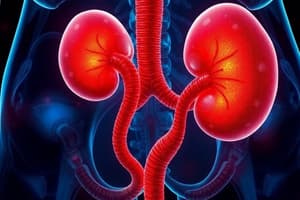Podcast
Questions and Answers
Which anatomic derangement can predispose patients to stone formation?
Which anatomic derangement can predispose patients to stone formation?
- Renal colic
- Polycystic kidney disease (correct)
- Urinary retention
- Renointestinal reflexes
Which medication can cause stones in some patients?
Which medication can cause stones in some patients?
- Antihistamines
- Antibiotics
- Antidepressants
- Antacids (correct)
What are the signs and symptoms of stones in the urinary system?
What are the signs and symptoms of stones in the urinary system?
- Blood in urine (correct)
- Increased urine output
- Fever and chills
- Painful urination
What happens when stones block the flow of urine?
What happens when stones block the flow of urine?
What symptoms are associated with stones in the renal pelvis?
What symptoms are associated with stones in the renal pelvis?
What are the symptoms of renal colic?
What are the symptoms of renal colic?
What symptoms are caused by renointestinal reflexes and the anatomical proximity of kidneys?
What symptoms are caused by renointestinal reflexes and the anatomical proximity of kidneys?
What are the symptoms of ureteral obstruction?
What are the symptoms of ureteral obstruction?
What substance mediates colic and increases ureteral contractility and renal blood flow?
What substance mediates colic and increases ureteral contractility and renal blood flow?
What is the usual size limit for a patient to pass a kidney stone?
What is the usual size limit for a patient to pass a kidney stone?
Urolithiasis refers to stones in the
Urolithiasis refers to stones in the
What is the prevalence of renal calculi in males?
What is the prevalence of renal calculi in males?
What is the prevalence of renal calculi in females?
What is the prevalence of renal calculi in females?
Are rates of renal calculi increasing among women?
Are rates of renal calculi increasing among women?
What factors favor the formation of stones in the urinary tract?
What factors favor the formation of stones in the urinary tract?
What are the different substances that can form stones in the urinary tract?
What are the different substances that can form stones in the urinary tract?
What are the common sites of calculi formation in the urinary tract?
What are the common sites of calculi formation in the urinary tract?
What are the causes of hypercalcemia and hypercalciuria?
What are the causes of hypercalcemia and hypercalciuria?
What percentage of stones in men are uric acid stones?
What percentage of stones in men are uric acid stones?
What percentage of stones in women are struvite stones?
What percentage of stones in women are struvite stones?
What are the predisposing factors for struvite stones?
What are the predisposing factors for struvite stones?
Flashcards are hidden until you start studying



